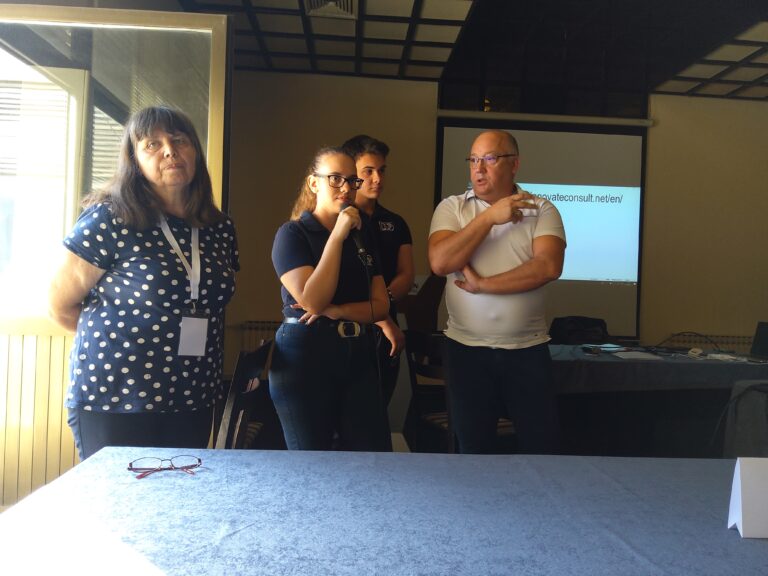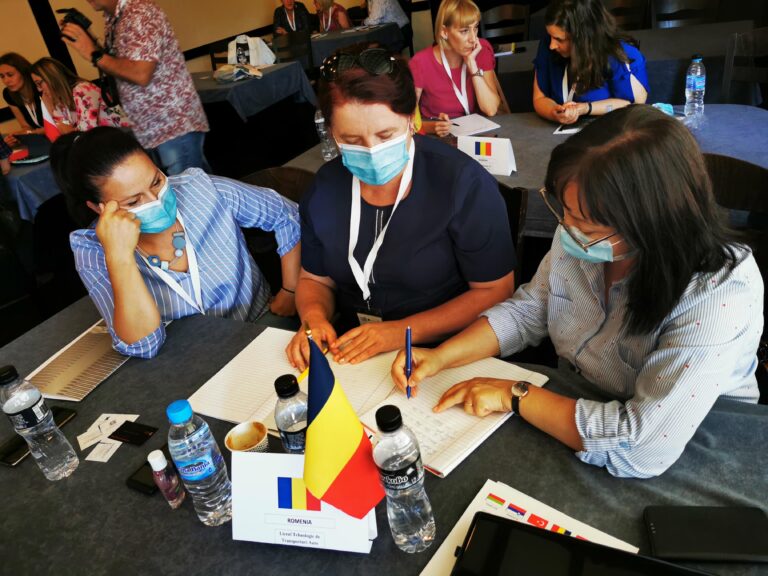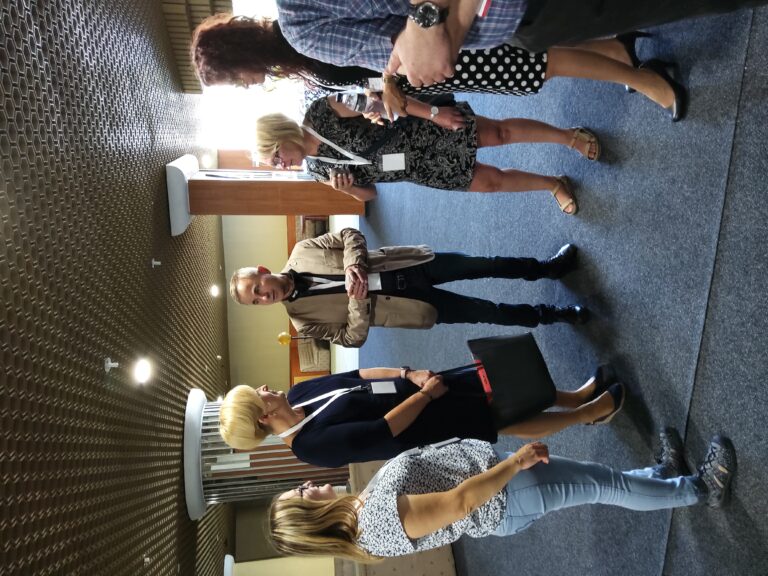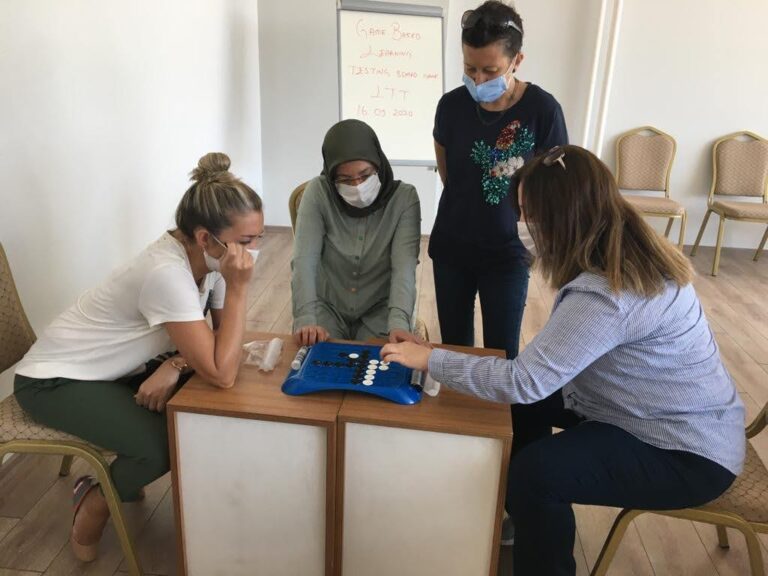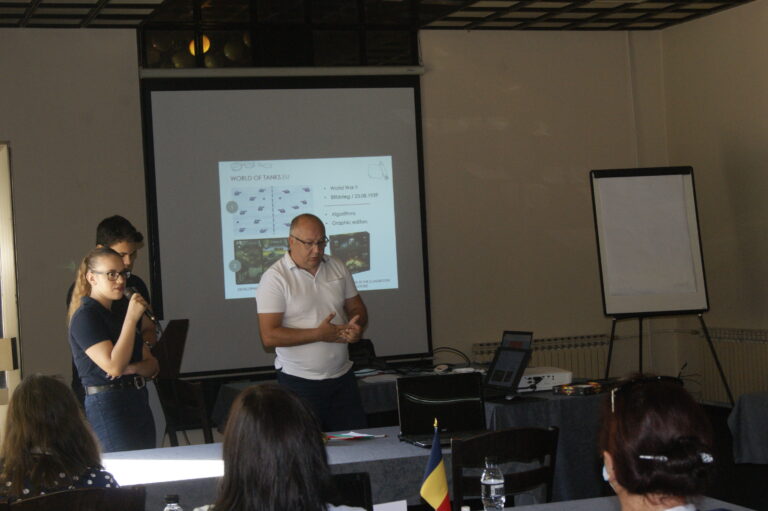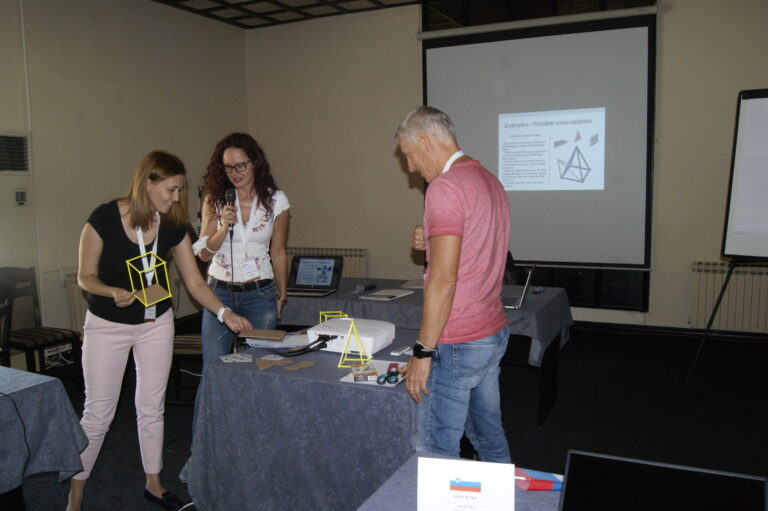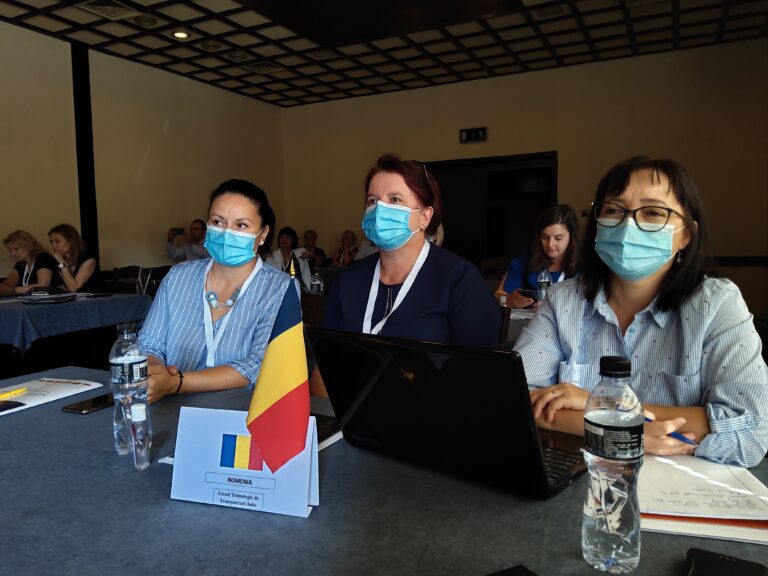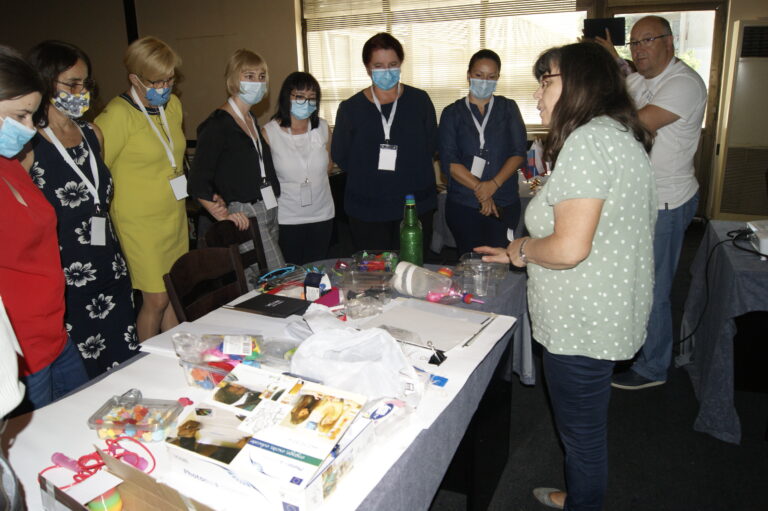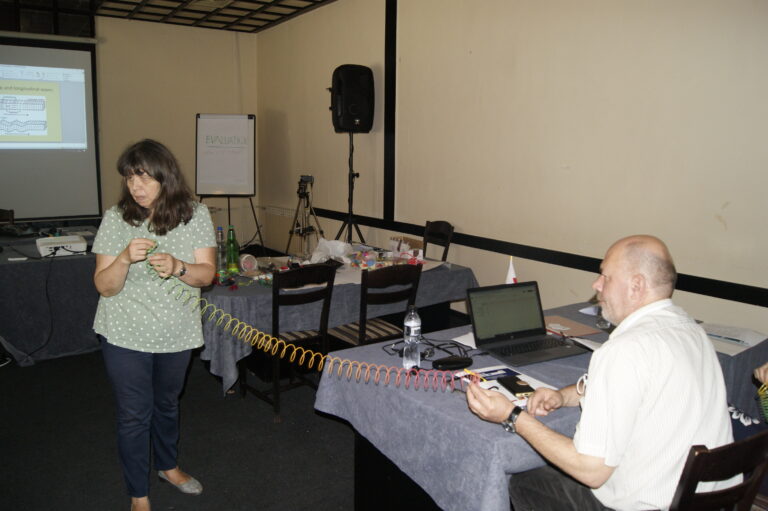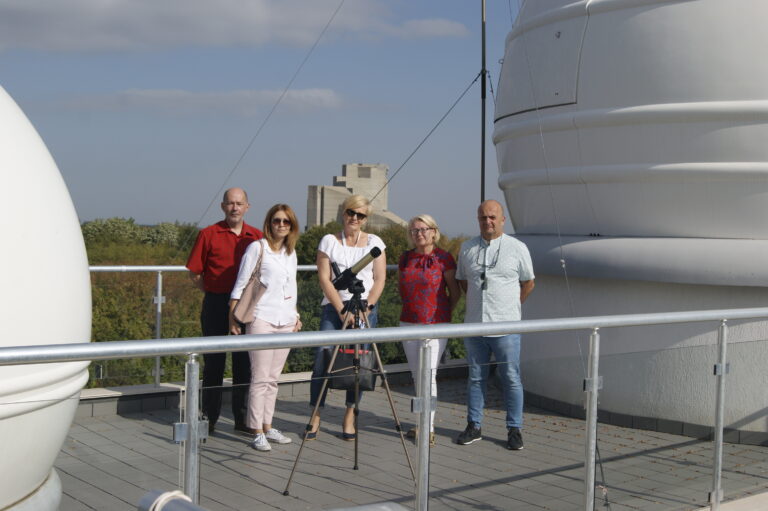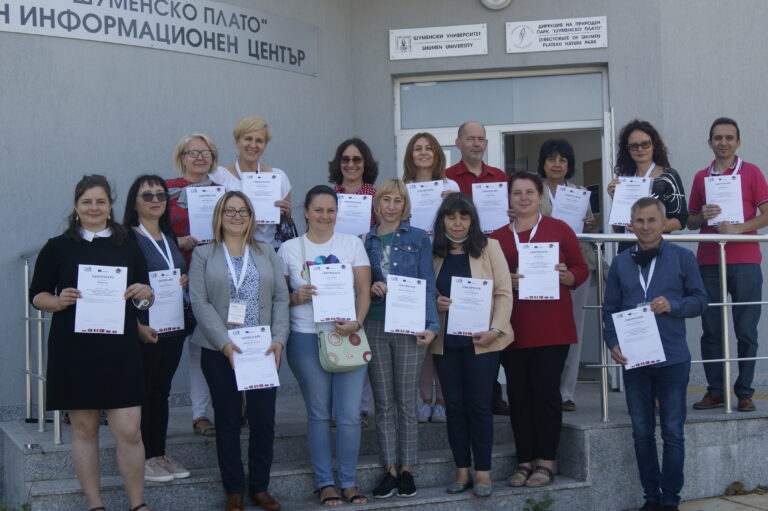GAME BASED LEARNING FOR DEVELOPMENT OF PROBLEM SOLVING SKILLS
Summary report
Game - based learning for development of problem solving skills
2019-1-PL01-KA201-065002
Learning, Teaching, Training Activity (LTT)
13-19 September, Shumen, Bulgaria
From 13 to 19 September 2020 the 1st LTT Activity to the project “Game-based learning for development of problem solving skills” to the Program “Erasmus +” was held in Shumen city, Bulgaria.
The event was attended by teachers, university lecturers and educational specialists from the partner organizations in the project from Bulgaria, Poland, Portugal, Romania, Slovenia and Turkey.
The participants were greeted by the Deputy Mayor for Education and Culture of the Municipality of Shoumen, Mr. Nayden Kosev, who wished them successful and fruitful work on the event and the project.
The host and organizer of the event was Scientific Educational Centre STEAM, a partner in the project. The event was held at the Grand Hotel Shumen with the representatives of Bulgaria, Poland, Slovenia and Romania, with the other partners it was held offline.
Participants at the Grand Hotel Shumen:
- Scientific Educational Centre STEAM (Bulgaria)
Silvina Simeonova, Prof.Nataliya Pavlova, Prof. Dragomir Marchev, Dr. Angel Angelov, Violeta Marazova, Lyubomir Manov, Gergana Manova, Aneta Marinova, Hubanka Hubanova Salimehmed Niyazi ,Ilina Kotzeva, Ilka Dimitrova, Vladislav Genov (13).
- ZSPC (Poland)
Aleksander Lizak, Gustaw Cedro, Barbara Oleksy, Patrycja Naruszewicz, Kamila Góra,
Janusz Cezary Salamończyk, Małgorzata Limanówka (7).
- SD (Poland)
Anna Rydzewska,Sylwia Łozińska, Jerzy Kołaczyk (3)
- SMART(Slovenia) – Igor Razbornik (1).
- Liceul Tehnologic de Transporturi Auto (Romenia)
Anamaria Gabriela Pop,Mihaela Fat, Ancuta Tirean, Marcela Vava, Iolanda Sztrelenczuk (5).
Totally participants in Shumen – 29 persons.
Participant in event offline:
- Mahmut Sami Ramazanoğlu AİHL Çevre Yolu Cad.Akıncılar Mah. No:111 Selçuklu (Turkey) Konya Turkey
Müzeyyen Aykut, Nihan Ege Erbulat, Ayşe Sevindi, Ramazan Kuzucu (4)
- Konya İl Milli Eğitim Müdürlüğü
Emrah Koçak,Mehmet Tokgöz, Gülsen Kaymak (3).
- Epralima (Portugal)
Luis Guimaraes, Sergio Esteves, Carla Moreira, Rosa Gomes, Ricardo Gomes, Odete Lorenço (6).
Totally participants offline – 13 persons
Totally participants in event – 42 persons
There were two main aims of the event:
- the participants to be introduced to the subject of the project and to be prepared as trainers for teachers in their countries on the use of Game- based learning (GBL) approach for developing problem-solving skills.
- to be finished of the GBL Manual of good practices in its structure and content. The tasks of the event were the participant to:
- get additional knowledge regarding GBL,
- learn about the methodology of the implementation of GBL in education and to support development of problem-solving skills with students,
- test gathered good practice,
- define metrics for selection of good practices,
- define what in principle teachers need in the manual,
- make final suggestion for the manual.
The program of the event included a theoretical examination of the basic concepts underlying the project (game-based learning and problem-solving skills), as well as the presentation of educational approaches for the implementation of education using so-called serious games.
There were two theoretical reports concerning basic terms and concepts of the project (GBL and problem-solving skills).
The reports concerning the implementation of GBL in education covered all educational subjects in secondary schools without native languages – studying of foreign languages, mathematics, physics, chemistry, biology, geography, astronomy, history and IT disciplines. The most of these reports were accompanied by practical activities which were interesting and useful for participants in the events. The practical activities were done to both kinds of games– board games and online games,
The accent put by all above presentations was on the methodology of teaching with games.
The topics of the presentations:
- Presentation of the project and its two basic terms- GBL and Problem Solving Skills. Presentation about the methodology of the implementation of GBL in education and connection with problem solving skills. Presentation of the implementation of GBL in all school subjects.
- Presentation of the project, main deliverables and goals
–Igor Razbornik (SMART).
- Concepts and methodology of GB – Silvina Simeonova (STEAM).
- Analysis of the nature of the concept of the problem-solving skills
– Prof. Natalia Pavlova (STEAM).
- How to implement Game-Based Learning in the classroom (online games)
–Silvina Simoeonova (STEAM).
- Development of different use cases for using educational games in the classroom. Experiments, animations, simulations, digital technologies
– Dr. Angel Angelov (STEAM).
- Educational games in mathematics – Natalia Pavlova (STEAM).
- Educational games in geography education – Gergana Manova (STEAM).
- Educational games in biology education – Silvina Simeonova (STEAM).
- Educational games in foreign languages – Hubanka Hubanova (STEAM).
- Educational games in physics (board games) – Aneta Marinova (STEAM).
- Educational games in physics (online) – Silvina Simeonova(STEAM).
- How to implement Game-Based Learning in the classroom (online games) history
– Violeta Marazova (STEAM).
- How to implement Game-Based learning in the classroom(online games) chemistry
– Lyubomir Manov(STEAM).
- How to implement Game-Based Learning in the classroom (board games)
– ZSPC (Poland)
- Development of different use cases for using educational games in the classroom. Education of astronomy and geography by using astronomical devices, telescopes and an augmented reality in astronomical observatory Shumen
–Prof. Dragomir Marchev (STEAM).
- Tools and approach for testing methodologies. Group work
According to the tasks of the LLT Activity about the testing of gathered good practice and to define what teachers need in the Manual, there was a theoretical presentation about the testing and subsequent group work. Тhere was used the very good approach for group work, the brainstorm, on the specific questions, were used important terms such “problem three” and another ones. Тhe participants got acquainted with the procedere for testing of games using respective sets of criteriа which they applied in the group work.
- Introduction to testing of selected games; goals of the exercise
– Igor Razbornik (SMART).
- Group work – What do you expect from the manual which helps you implement GBL into your classroom? – Igor Razbornik (SMART).
- Testing selected games by 4 groups and reporting (6 activities)
– Igor Razbornik (SMART).
- Group work – Final ideas what to add or change into the structure of the GBL Manual after all lectures and tests?
– Igor Razbornik (SMART).
- The results of the group work:
- every described game concerning update / correct description, update evaluation done by partner,was tested,
- suggestions and ideas by participants about “How should Manual looks like?”, such structure and content,
- group work on preparation of Educational portal.
In order the foreign participants to acquaint with the rich cultural and historical heritage of the Shumen city and the region around the city, where are located the first Bulgarian capitals Pliska and Preslav, were visited the Regional Museum of History in Shumen and the Monument to 1300 Years of Bulgaria.
Judging by the interest of the participants shown during the presentations and their active involvement in the practical activities related to board and online educational games, as well as the understanding and responsibility in testing the games, it can be concluded that the training was fulfilled.
Тhe teachers gathered new knowledge and see examples of good practices. They were motivated to become educators for their colleague, to be project promoters in their countries concerning the implementation of the developed methodology into school, which is the needed condition the project to be successful.
In conclusion the theoretical part, practical part and group work were complemented each other very well, which contributed to the training being enjoyable and useful.
The report is done by
Silvina Simeonova,
Chairman of Scientific Educational Centre STEAM
24.09.2020
Shumen, Bulgaria


